8A Chapter 3 A diary [上学期]
文档属性
| 名称 | 8A Chapter 3 A diary [上学期] |
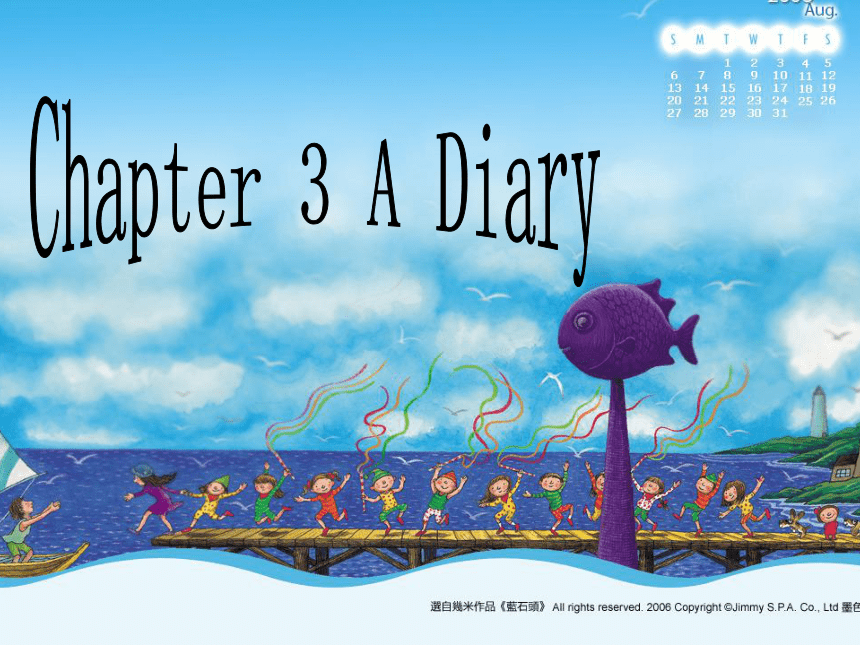
|
|
| 格式 | rar | ||
| 文件大小 | 6.6MB | ||
| 资源类型 | 教案 | ||
| 版本资源 | 其它版本 | ||
| 科目 | 英语 | ||
| 更新时间 | 2009-03-04 19:45:00 | ||
图片预览


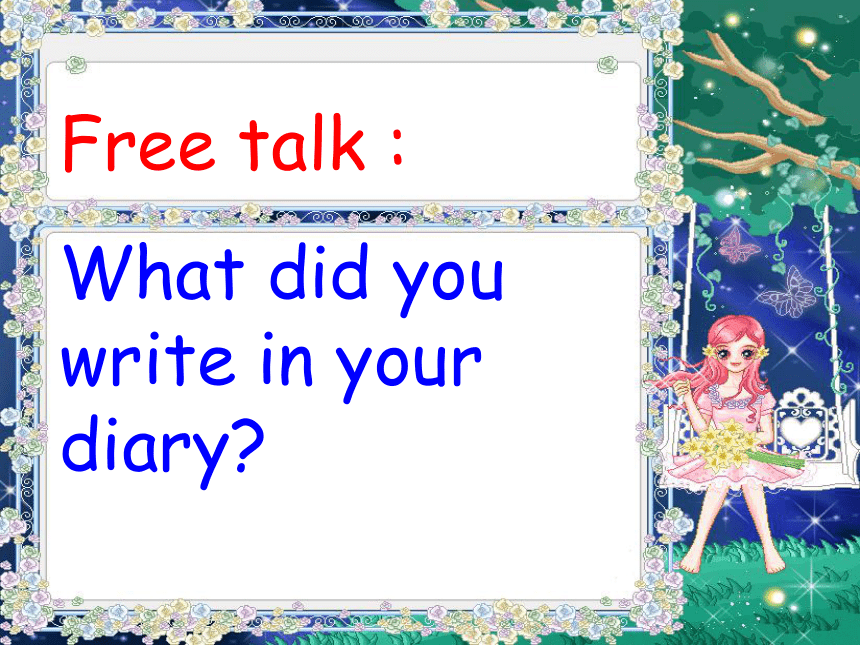
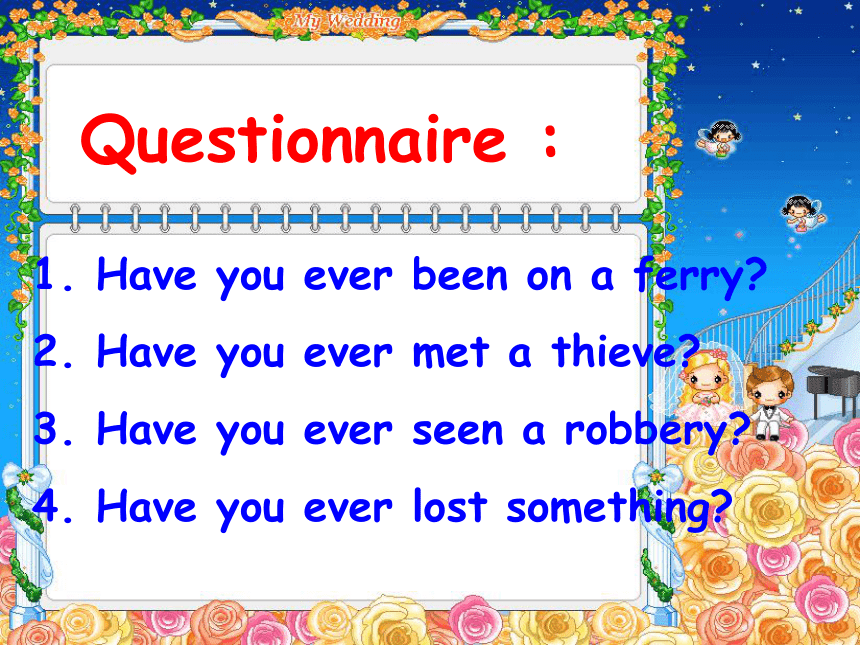
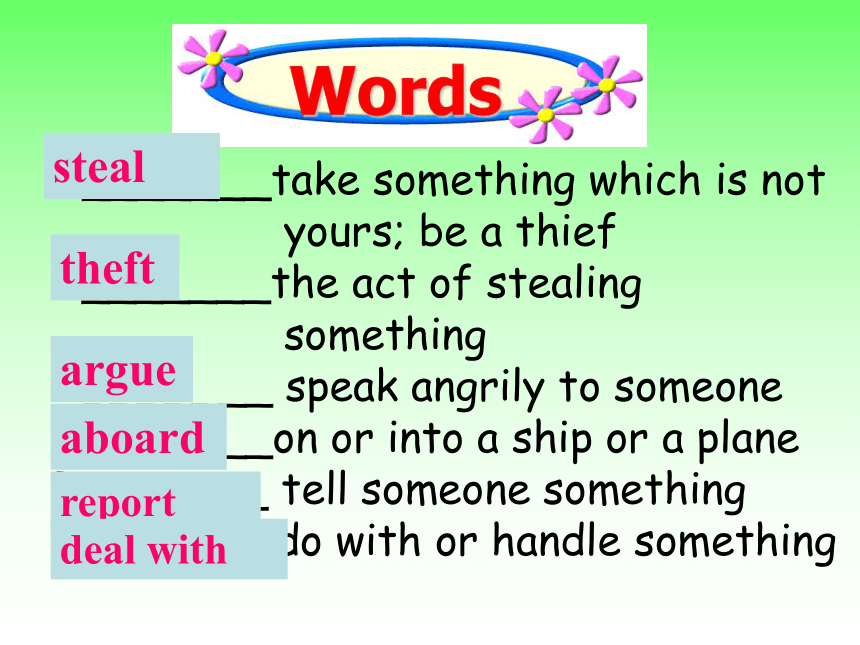
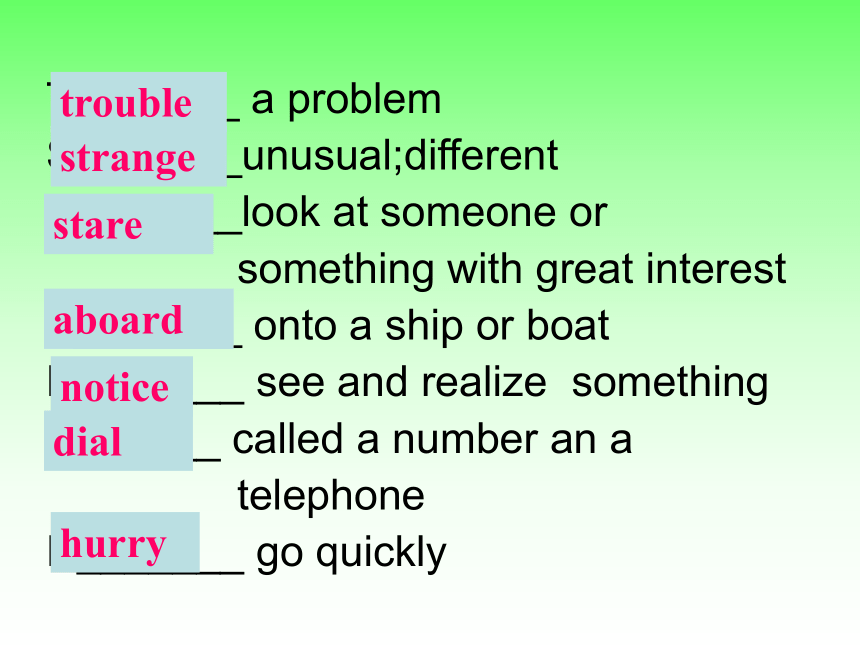
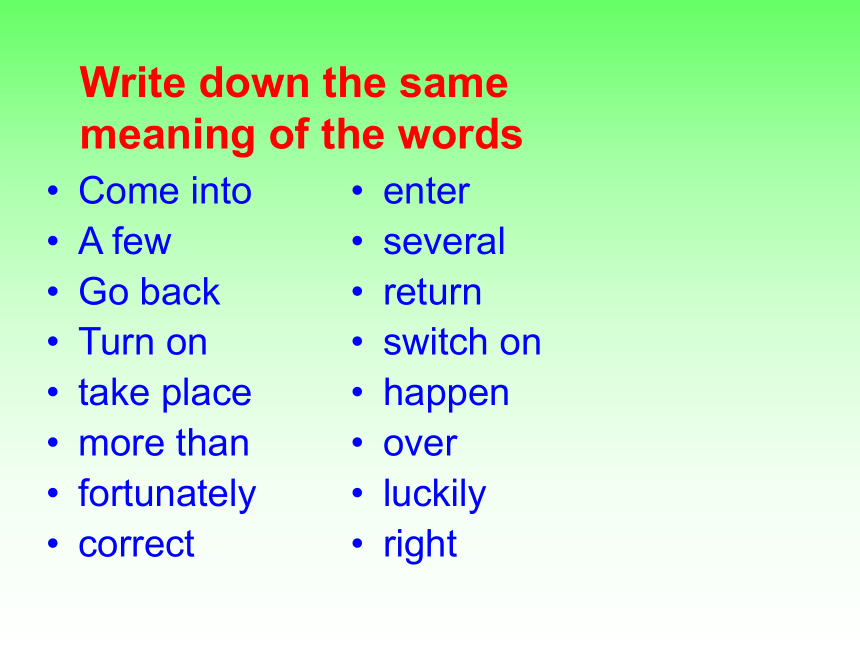
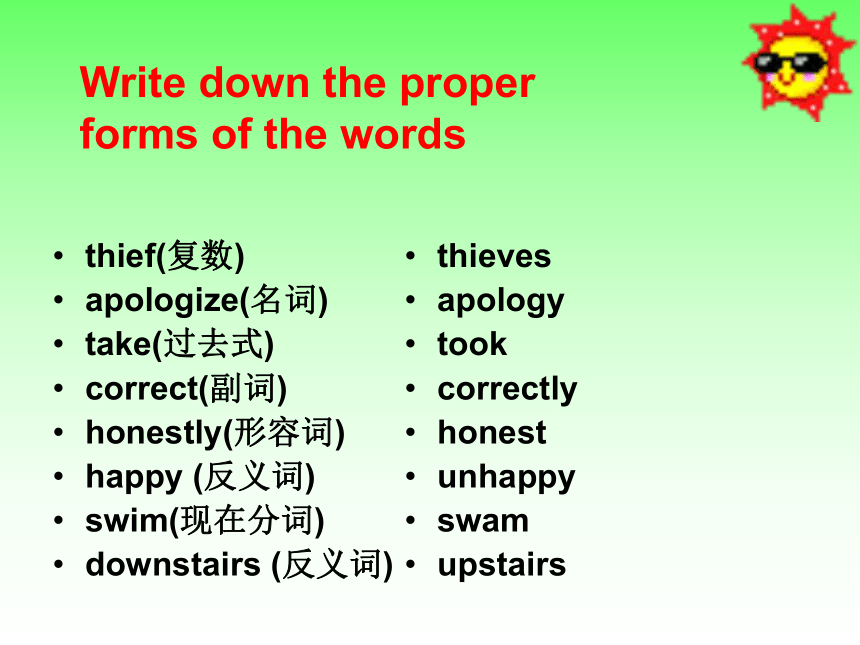
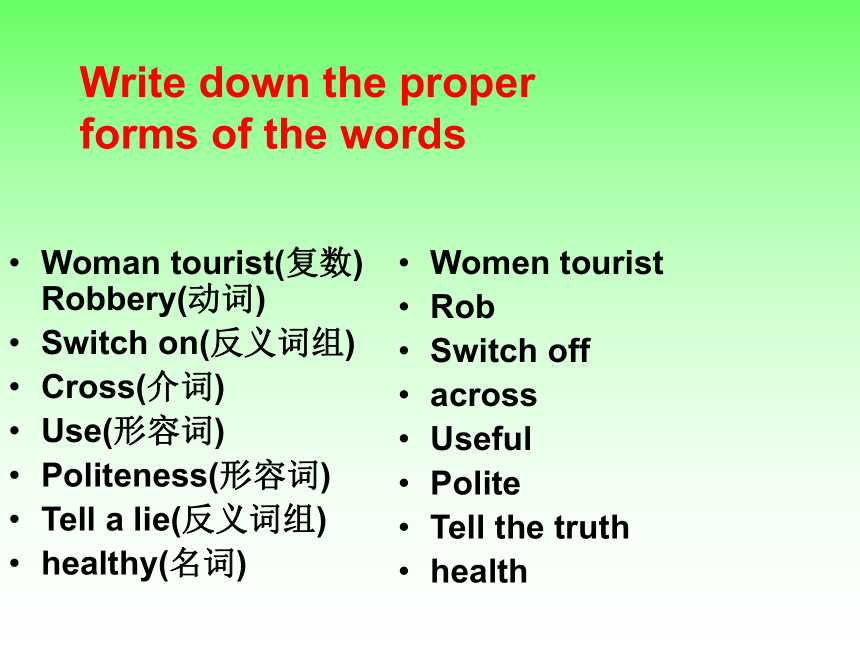
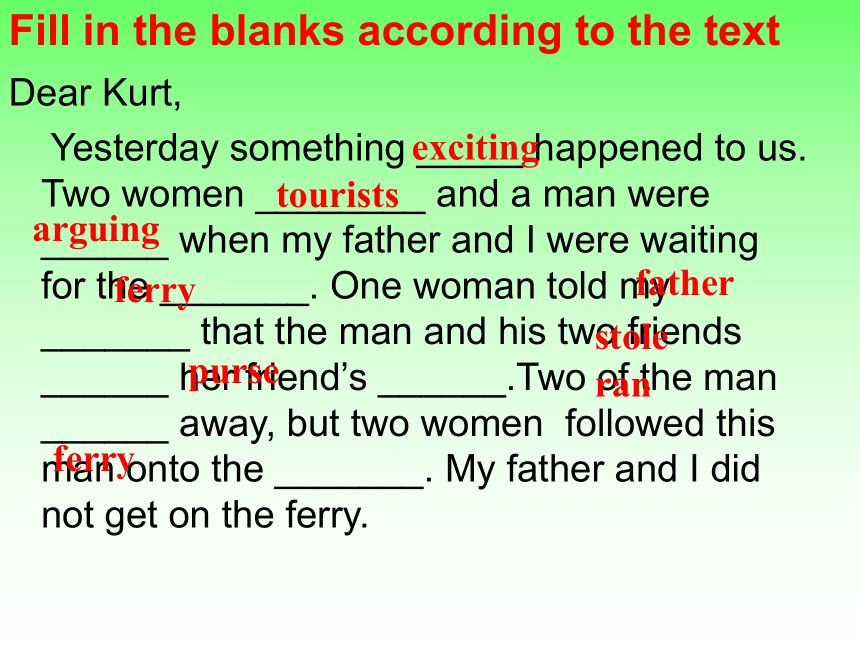
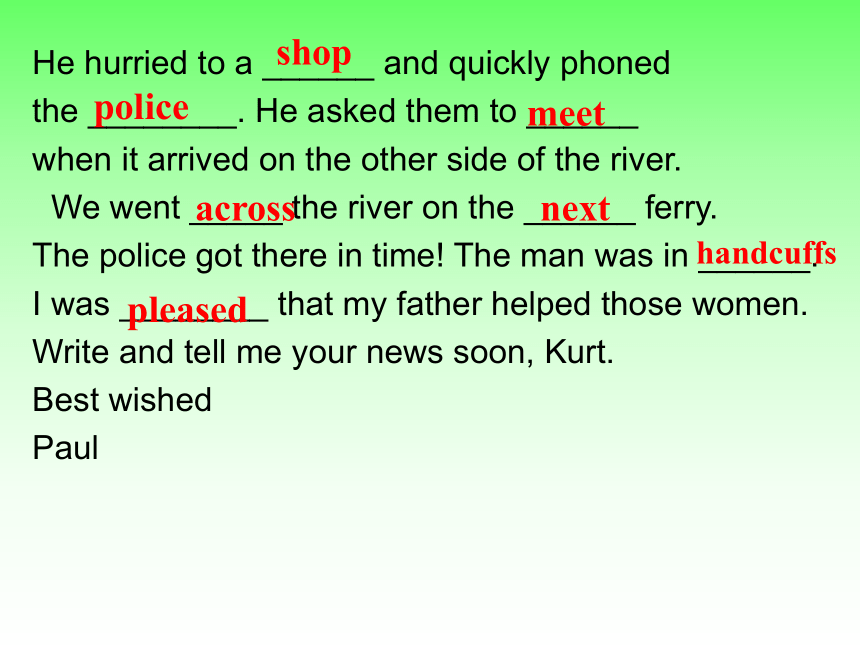
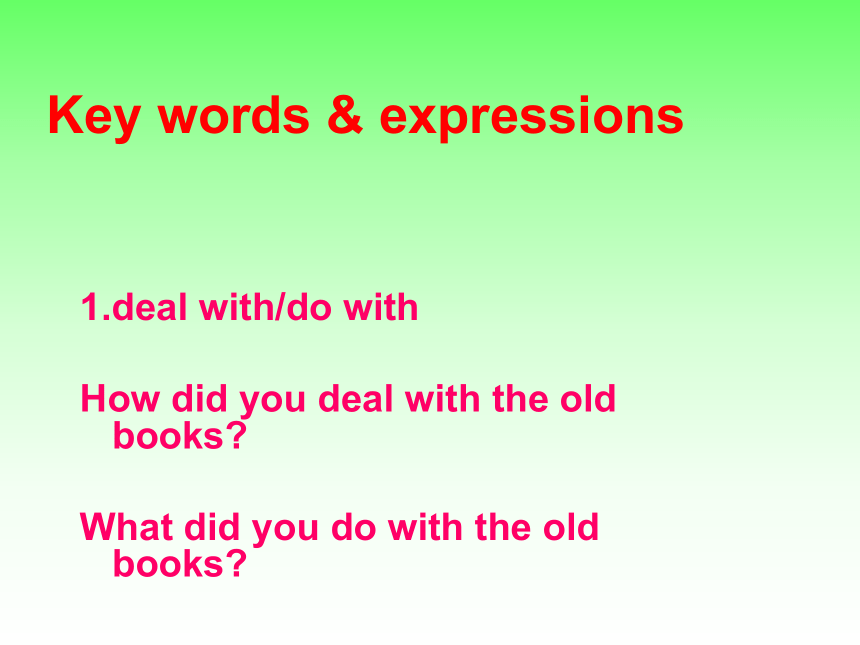
文档简介
课件48张PPT。Chapter 3 A DiaryHave you got a diary?Free talk :
What did you write in your diary?
Questionnaire :1. Have you ever been on a ferry?
2. Have you ever met a thieve?
3. Have you ever seen a robbery?
4. Have you ever lost something?Words S_______take something which is not
yours; be a thief
T_______the act of stealing
something
A_______ speak angrily to someone
A_______on or into a ship or a plane
R_______ tell someone something
D___w___do with or handle somethingstealtheftargueaboardreportdeal withT_______ a problem
S_______unusual;different
S_______look at someone or
something with great interest
A_______ onto a ship or boat
N_______ see and realize something
D______ called a number an a
telephone
H_______ go quickly
troublestrangestareaboardnoticedialhurryCome into
A few
Go back
Turn on
take place
more than
fortunately
correct
enter
several
return
switch on
happen
over
luckily
right
Write down the same meaning of the wordsthief(复数)
apologize(名词)
take(过去式)
correct(副词)
honestly(形容词)
happy (反义词)
swim(现在分词)
downstairs (反义词)thieves
apology
took
correctly
honest
unhappy
swam
upstairsWrite down the proper forms of the wordsWoman tourist(复数) Robbery(动词)
Switch on(反义词组)
Cross(介词)
Use(形容词)
Politeness(形容词)
Tell a lie(反义词组)
healthy(名词)
Women tourist
Rob
Switch off
across
Useful
Polite
Tell the truth
health
Write down the proper forms of the wordsDear Kurt,
Yesterday something _____ happened to us. Two women ________ and a man were ______ when my father and I were waiting for the _______. One woman told my _______ that the man and his two friends ______ her friend’s ______.Two of the man ______ away, but two women followed this man onto the _______. My father and I did not get on the ferry. excitingtouristsarguingferryfatherstolepurseranferryFill in the blanks according to the textHe hurried to a ______ and quickly phoned
the ________. He asked them to ______
when it arrived on the other side of the river.
We went _____ the river on the ______ ferry.
The police got there in time! The man was in ______.
I was ________ that my father helped those women.
Write and tell me your news soon, Kurt.
Best wished
Paulnexthandcuffspleasedacrossshoppolicemeet
1.deal with/do with
How did you deal with the old books?
What did you do with the old books?
Key words & expressions2.argue v. argument n.
argue with sb.
=have argument with sb.
You should’t argue with your parents.
argue about/over sth.
3.man 和 woman
a woman tourist
two women tourists
a man doctor
three men doctors
4.stare at sb. / sth.
He stared at the word trying to remember what it meant.
5. move through the crowd
move v.
He moved through the crowd to see what
was happening.
She moved quickly to the door.
6.follow
I opened the door and followed him to the car.
I’m sorry. I don’t quiet follow you.
We should follow the rules for the competition.
Put the following sentences into English.
7.aboard adv.
The bell rang and the man hurried aboard.
It’s time to get aboard.8.report v.
report sth. to sb.
We reported the theft to the police.
The reporter wrote a report on the theft
9.theft n. thief n.
The thief stole the woman’s purse. My father reported the theft to the police.
10.be in handcuffs
If a man is in handcuffs, we know that the police have caught him.
11.police n.
The police have caught the thief.
There were about 200 police on duty.
12 family n.
His family are all teachers.
His family is from the north.
No one
No one knew her name.
No one tells him how to do it.
辨析: no one 与none
(1)no one 相当于nobody,只指人不指物,没有of 短语,用作单数。
No one told us about that.关于那件事没有人告诉过我们。(不用None)
(2)none意为“没有人或没有物”,指三者以上,反义词是all。常与of 构成短语“none…”,作主语时谓语动词可以是单数(一个都不),也可以是复数(全都不)。
How many elephants did you see there?
None.
None of them have (has) arrived.[拓展]
用who, what 提问的句子分别用no one , nothing 来回答,用how many, how much 提问的句子,用 none来回答。
—Who lives in the next house?
—No one.
—How many student are there in your classroom now?
—None.
2.through prep
We walked through the market to the truck park.
The thief got in through the window.
[拓展]
through adv.
They wouldn’t let us though.
Have you read the letter though?
3.notice ut.&ui.(常与that, how连用)注意到,看到,留心,主要用来指偶然看到或无意识地看到某一细节或某一情况,此细节或情况对全局可能有很大影响,侧重所观察或注意的结果。用法如下:
And you didn’t notice anything unusual?
[一点通]
(1)notice sb.+动词原形
Did you notice him leave the house?
(2) notice sb. +doing
At this moment she noticed her father coming in.
(3)notice+从句
He did not notice a young man had entered the room.
Choose the best answer.
1.Janet got on the ferry and would meet Jack ____of the river.
A. on another side B. on the other side
C. on that side D. on other side
2.The door ____ and everyone started ____off the train.
A. opened, getting B. opened, get
C. was open, got D. opened, got3.What ____ over there? Let’s go and have a ____.
A. is happening, look
B. is happening, see
C. happens, look
D. happened, see
4.His family ____ a large one. The whole family ____ reading.
A. is, likes B. are, like
C. are, likes D. is, like5.Don’t forget ____ me when you finish the work.
A. call B. to call
C. calling D. called
6.The students are busy ____for their English text.
A. with one’s study
B. study
C. to study
D. studying7.He made a toy train ____his son. Now the boy is playing happily ____it.
A. for, with B. for, on
C. to, with D. to, on
8.Where have you ____? You are wet all over.
A. gone B. been
C. stayed D. lived9. How many cities ____ the Greens ____ since they came to China?
A. has…travelled
B. has… travelled to
C. have… travelled
D. have…travelled to
10. I ____ in the swimming pool when I _____ about it.
A. swam, heard
B. swam, was learning
C. was swimming, heard
D. was swimming, was hearing11. Alice likes Chinese very much. She does her best _____ it well.
A. learn B. to learn
C. learning D. of learning
12. I don’t like ____ people _____ something bad about their neighbours.
A. to hear, talk B. hear, talking
C. hearing, talk D. hear, talk
13. We use the words like fast and brave___ a runner.
A. to describe B. describing
C. describe D. describes
14. I notice him ____ into the library when I ___ through the window.
A. walked, looking
B. walking, looked
C. to walk, looked
D. walk, look
15. John ___ well in all the subjects. He has never ____ in exam.
A. does, missed
B. is doing, missed
C. does, fail
D. does, failed1、直接宾语 He doesn't like cold weather. The news surprised us. A baby can't dress himself. I like reading. I want five. He promised to help me. I wonder how to do it. I hope that you'll enjoy yourself. Grammar:
直接宾语和间接宾语
2、间接宾语 He offered Peter the job. I must give the room a good airing.
两种宾语在句子中的位置: 通常为"间接宾语+直接宾语": He doesn't own me anything. She asked me whether I had been there before. I warned you he would be late. Give me it./Give it to me. They told us where to shop cheaply. 间接宾语后移,
间接宾语用to 或for 引出:
They give it to John. He sold his old car to one of his neighbours. I have bought some chocolate for you. Give the dictionary to me, please. 个别动词的间接宾语后移时,需要其他介词连用: They bear me a grudge.
They bear a grudge against me.他们对我怀恨在心。 Will you play me a game of chess?
Will you play a game of chess with me ? May I ask you a favour?
May I ask a favour of you?请你帮个忙好吗?
有时为了形成对照或是为了突出重点,"介词+间接宾语"也可移到主语的前面去: To his daughter he sent a cheque of $50 but to his sun he sent only a cheap pen. 如果"介词+间接宾语"比直接宾语短,也可以直接放在谓语动词后: He give to his friends much of the time he should have given to his wife and children.
一些句子中,"间接宾语+直接宾语"不能变为"直接宾语+介词+间接宾语": He give the door a hard kick. I never give the matter a thought. She give him a warm smile. This heroic deed cost him his life.此结构由主语+及物谓语动词+间接宾语(人)+直接宾语(事物)组成。如,
He brings me cookies every day.
She made me a beautiful dress.
但若要先说出直接宾语(事物),后说间接宾语(人),则要借助于介词to或for,如,
He brings cookies to me every day.
She made a beautiful dress for me.
用to侧重指动作的方向,表示朝着,向着,对着某人。
用for 侧重指动作的受益者,表示为了某人,替某人。 常跟双宾语的动词有:
(需借助to的)bring, give, lend, hand, offer, pass, pay, promise,?return, send, show, teach, tell, write, ask,等。
(需借助for 的) buy, call, cook, choose, draw, find, get, make, order,?sing, save, spare,等。
1.这台收音机花了他近600元。(cost him ,nearly)
?????????????????????????????????????????
2. 新式机器将会为你节省许多劳动。
___________________________
This radio cost him nearly 600 yuan. The new machine will save you
a lot of labour.Translation 根据汉语意思和提示词,翻译句子。
3.她给了我一些漂亮的长城照片。(give me;pictures)
???????????????????????????????????????
4.迈克借给我一本新书。(lend;to me)
???????????????????????????????????????
5.昨天我妈妈给我买了一件新毛衣。(buy ;for me)
??????????????????????????????????????? She gave me some beautiful pictures of the Great Wall. Mike lent a new book to me. My mother bought a new sweater for me yesterday. 6. Johnson 先生去年教我们德语。
Mr Johnson taught us German last year. ?
7. 奶奶昨晚给我们讲了一个有趣的故事。
Grandma told me an interesting story last night. ?
8. Mary把钱包交给校长了。
Mary handed the wallet to the schoolmaster.
9. 请把那本字典递给我好吗?
Would you please pass me the dictionary? ?
10. 他把车票给列车员看。
He showed the ticket to the conductor. 11. 这个学期我已经给父母写过三封信了。
This term I have written three letters to my parents. ?
12. 我父亲已经给我买了一辆新自行车。
My father has bought me a new bike.
13. Robinson Crusoe 给自己做了一只小船。
Robinson Crusoe made himself a boat.
14. 请你给我弄一本新的,好吗?
Will you please get me a new copy?
15. 我替你叫辆出租汽车好吗?
Shall I call you a taxi? Dad:Could you please _____ today’s
newspaper to me, Paul?
Paul:Look, Dad! It has the news about the
two women tourists and the big man.
I’ll _____ it ____you.
Dad:OK. What does it say?
Paul:Let me see. Three men stole a purse
from a woman…A shop assistant
_____ his phone _____ a passer-by …passreadtolenttoExercises on text book P66
The passer-by______the accident _____
the police…He _____ everything _____
the police…The police _____ the purse
_____the woman…
Dad:Thanks,Paul. Can you _____ the
newspaper _____ me and _____ a
bottle of orange juice _____ me from
the fridge?
forpasstogetforreportedfoundtoldtotoActivity Eye-witness 目 的:模拟交际:目击证人向警方提供疑犯情况,巩 固用英语描述人体部位和外形特征的词汇、描述过 去发生的事情,强调动词过去式的正确运用 语言技能:Listening, reading, speaking and writing 语言知识: What does he/she look like? He is tall and thin/medium height/medium build. His hair is straight/curly/black/brown/blonde/short/long. He has big eyes/a round face/moustache… He is wearing… He stole… He robbed… He ran away from… 活动形式:Group work: A—the eyewitness; B—the police officer Eye Witness Student A Student B
the eye-witness the police officer
Pair WorkTo ask questions and fill in the form.To describe the man to the police officerThe police officer may ask:
Where did you see him ?
What did the man look like?
Was the man young or old? Was he tall?
What was he wearing? What did he take?
What did he do? where did he run away?
Are you a good witness Pair Work Student B WANTED 材 料: 提供真实的通缉令一份 教学过程: (1)教师布置任务,提出具体要求,并用屏幕展 示一份真实的通缉令,供学生阅读后仿写; (2)学生A、B根据Eyewitness活动合作拟写一 份绑架疑犯通缉令; (3)学生和老师选出“最佳作者”数名,给予表 扬,并把作品存入个人档案袋中。 Eye Witness Student AAre you a good witness?Look and learnOptional resource http://www.hjenglish.com/page/11429/
新概念英语第二册--Lesson 03
Lesson Three--Please send me a card
What did you write in your diary?
Questionnaire :1. Have you ever been on a ferry?
2. Have you ever met a thieve?
3. Have you ever seen a robbery?
4. Have you ever lost something?Words S_______take something which is not
yours; be a thief
T_______the act of stealing
something
A_______ speak angrily to someone
A_______on or into a ship or a plane
R_______ tell someone something
D___w___do with or handle somethingstealtheftargueaboardreportdeal withT_______ a problem
S_______unusual;different
S_______look at someone or
something with great interest
A_______ onto a ship or boat
N_______ see and realize something
D______ called a number an a
telephone
H_______ go quickly
troublestrangestareaboardnoticedialhurryCome into
A few
Go back
Turn on
take place
more than
fortunately
correct
enter
several
return
switch on
happen
over
luckily
right
Write down the same meaning of the wordsthief(复数)
apologize(名词)
take(过去式)
correct(副词)
honestly(形容词)
happy (反义词)
swim(现在分词)
downstairs (反义词)thieves
apology
took
correctly
honest
unhappy
swam
upstairsWrite down the proper forms of the wordsWoman tourist(复数) Robbery(动词)
Switch on(反义词组)
Cross(介词)
Use(形容词)
Politeness(形容词)
Tell a lie(反义词组)
healthy(名词)
Women tourist
Rob
Switch off
across
Useful
Polite
Tell the truth
health
Write down the proper forms of the wordsDear Kurt,
Yesterday something _____ happened to us. Two women ________ and a man were ______ when my father and I were waiting for the _______. One woman told my _______ that the man and his two friends ______ her friend’s ______.Two of the man ______ away, but two women followed this man onto the _______. My father and I did not get on the ferry. excitingtouristsarguingferryfatherstolepurseranferryFill in the blanks according to the textHe hurried to a ______ and quickly phoned
the ________. He asked them to ______
when it arrived on the other side of the river.
We went _____ the river on the ______ ferry.
The police got there in time! The man was in ______.
I was ________ that my father helped those women.
Write and tell me your news soon, Kurt.
Best wished
Paulnexthandcuffspleasedacrossshoppolicemeet
1.deal with/do with
How did you deal with the old books?
What did you do with the old books?
Key words & expressions2.argue v. argument n.
argue with sb.
=have argument with sb.
You should’t argue with your parents.
argue about/over sth.
3.man 和 woman
a woman tourist
two women tourists
a man doctor
three men doctors
4.stare at sb. / sth.
He stared at the word trying to remember what it meant.
5. move through the crowd
move v.
He moved through the crowd to see what
was happening.
She moved quickly to the door.
6.follow
I opened the door and followed him to the car.
I’m sorry. I don’t quiet follow you.
We should follow the rules for the competition.
Put the following sentences into English.
7.aboard adv.
The bell rang and the man hurried aboard.
It’s time to get aboard.8.report v.
report sth. to sb.
We reported the theft to the police.
The reporter wrote a report on the theft
9.theft n. thief n.
The thief stole the woman’s purse. My father reported the theft to the police.
10.be in handcuffs
If a man is in handcuffs, we know that the police have caught him.
11.police n.
The police have caught the thief.
There were about 200 police on duty.
12 family n.
His family are all teachers.
His family is from the north.
No one
No one knew her name.
No one tells him how to do it.
辨析: no one 与none
(1)no one 相当于nobody,只指人不指物,没有of 短语,用作单数。
No one told us about that.关于那件事没有人告诉过我们。(不用None)
(2)none意为“没有人或没有物”,指三者以上,反义词是all。常与of 构成短语“none…”,作主语时谓语动词可以是单数(一个都不),也可以是复数(全都不)。
How many elephants did you see there?
None.
None of them have (has) arrived.[拓展]
用who, what 提问的句子分别用no one , nothing 来回答,用how many, how much 提问的句子,用 none来回答。
—Who lives in the next house?
—No one.
—How many student are there in your classroom now?
—None.
2.through prep
We walked through the market to the truck park.
The thief got in through the window.
[拓展]
through adv.
They wouldn’t let us though.
Have you read the letter though?
3.notice ut.&ui.(常与that, how连用)注意到,看到,留心,主要用来指偶然看到或无意识地看到某一细节或某一情况,此细节或情况对全局可能有很大影响,侧重所观察或注意的结果。用法如下:
And you didn’t notice anything unusual?
[一点通]
(1)notice sb.+动词原形
Did you notice him leave the house?
(2) notice sb. +doing
At this moment she noticed her father coming in.
(3)notice+从句
He did not notice a young man had entered the room.
Choose the best answer.
1.Janet got on the ferry and would meet Jack ____of the river.
A. on another side B. on the other side
C. on that side D. on other side
2.The door ____ and everyone started ____off the train.
A. opened, getting B. opened, get
C. was open, got D. opened, got3.What ____ over there? Let’s go and have a ____.
A. is happening, look
B. is happening, see
C. happens, look
D. happened, see
4.His family ____ a large one. The whole family ____ reading.
A. is, likes B. are, like
C. are, likes D. is, like5.Don’t forget ____ me when you finish the work.
A. call B. to call
C. calling D. called
6.The students are busy ____for their English text.
A. with one’s study
B. study
C. to study
D. studying7.He made a toy train ____his son. Now the boy is playing happily ____it.
A. for, with B. for, on
C. to, with D. to, on
8.Where have you ____? You are wet all over.
A. gone B. been
C. stayed D. lived9. How many cities ____ the Greens ____ since they came to China?
A. has…travelled
B. has… travelled to
C. have… travelled
D. have…travelled to
10. I ____ in the swimming pool when I _____ about it.
A. swam, heard
B. swam, was learning
C. was swimming, heard
D. was swimming, was hearing11. Alice likes Chinese very much. She does her best _____ it well.
A. learn B. to learn
C. learning D. of learning
12. I don’t like ____ people _____ something bad about their neighbours.
A. to hear, talk B. hear, talking
C. hearing, talk D. hear, talk
13. We use the words like fast and brave___ a runner.
A. to describe B. describing
C. describe D. describes
14. I notice him ____ into the library when I ___ through the window.
A. walked, looking
B. walking, looked
C. to walk, looked
D. walk, look
15. John ___ well in all the subjects. He has never ____ in exam.
A. does, missed
B. is doing, missed
C. does, fail
D. does, failed1、直接宾语 He doesn't like cold weather. The news surprised us. A baby can't dress himself. I like reading. I want five. He promised to help me. I wonder how to do it. I hope that you'll enjoy yourself. Grammar:
直接宾语和间接宾语
2、间接宾语 He offered Peter the job. I must give the room a good airing.
两种宾语在句子中的位置: 通常为"间接宾语+直接宾语": He doesn't own me anything. She asked me whether I had been there before. I warned you he would be late. Give me it./Give it to me. They told us where to shop cheaply. 间接宾语后移,
间接宾语用to 或for 引出:
They give it to John. He sold his old car to one of his neighbours. I have bought some chocolate for you. Give the dictionary to me, please. 个别动词的间接宾语后移时,需要其他介词连用: They bear me a grudge.
They bear a grudge against me.他们对我怀恨在心。 Will you play me a game of chess?
Will you play a game of chess with me ? May I ask you a favour?
May I ask a favour of you?请你帮个忙好吗?
有时为了形成对照或是为了突出重点,"介词+间接宾语"也可移到主语的前面去: To his daughter he sent a cheque of $50 but to his sun he sent only a cheap pen. 如果"介词+间接宾语"比直接宾语短,也可以直接放在谓语动词后: He give to his friends much of the time he should have given to his wife and children.
一些句子中,"间接宾语+直接宾语"不能变为"直接宾语+介词+间接宾语": He give the door a hard kick. I never give the matter a thought. She give him a warm smile. This heroic deed cost him his life.此结构由主语+及物谓语动词+间接宾语(人)+直接宾语(事物)组成。如,
He brings me cookies every day.
She made me a beautiful dress.
但若要先说出直接宾语(事物),后说间接宾语(人),则要借助于介词to或for,如,
He brings cookies to me every day.
She made a beautiful dress for me.
用to侧重指动作的方向,表示朝着,向着,对着某人。
用for 侧重指动作的受益者,表示为了某人,替某人。 常跟双宾语的动词有:
(需借助to的)bring, give, lend, hand, offer, pass, pay, promise,?return, send, show, teach, tell, write, ask,等。
(需借助for 的) buy, call, cook, choose, draw, find, get, make, order,?sing, save, spare,等。
1.这台收音机花了他近600元。(cost him ,nearly)
?????????????????????????????????????????
2. 新式机器将会为你节省许多劳动。
___________________________
This radio cost him nearly 600 yuan. The new machine will save you
a lot of labour.Translation 根据汉语意思和提示词,翻译句子。
3.她给了我一些漂亮的长城照片。(give me;pictures)
???????????????????????????????????????
4.迈克借给我一本新书。(lend;to me)
???????????????????????????????????????
5.昨天我妈妈给我买了一件新毛衣。(buy ;for me)
??????????????????????????????????????? She gave me some beautiful pictures of the Great Wall. Mike lent a new book to me. My mother bought a new sweater for me yesterday. 6. Johnson 先生去年教我们德语。
Mr Johnson taught us German last year. ?
7. 奶奶昨晚给我们讲了一个有趣的故事。
Grandma told me an interesting story last night. ?
8. Mary把钱包交给校长了。
Mary handed the wallet to the schoolmaster.
9. 请把那本字典递给我好吗?
Would you please pass me the dictionary? ?
10. 他把车票给列车员看。
He showed the ticket to the conductor. 11. 这个学期我已经给父母写过三封信了。
This term I have written three letters to my parents. ?
12. 我父亲已经给我买了一辆新自行车。
My father has bought me a new bike.
13. Robinson Crusoe 给自己做了一只小船。
Robinson Crusoe made himself a boat.
14. 请你给我弄一本新的,好吗?
Will you please get me a new copy?
15. 我替你叫辆出租汽车好吗?
Shall I call you a taxi? Dad:Could you please _____ today’s
newspaper to me, Paul?
Paul:Look, Dad! It has the news about the
two women tourists and the big man.
I’ll _____ it ____you.
Dad:OK. What does it say?
Paul:Let me see. Three men stole a purse
from a woman…A shop assistant
_____ his phone _____ a passer-by …passreadtolenttoExercises on text book P66
The passer-by______the accident _____
the police…He _____ everything _____
the police…The police _____ the purse
_____the woman…
Dad:Thanks,Paul. Can you _____ the
newspaper _____ me and _____ a
bottle of orange juice _____ me from
the fridge?
forpasstogetforreportedfoundtoldtotoActivity Eye-witness 目 的:模拟交际:目击证人向警方提供疑犯情况,巩 固用英语描述人体部位和外形特征的词汇、描述过 去发生的事情,强调动词过去式的正确运用 语言技能:Listening, reading, speaking and writing 语言知识: What does he/she look like? He is tall and thin/medium height/medium build. His hair is straight/curly/black/brown/blonde/short/long. He has big eyes/a round face/moustache… He is wearing… He stole… He robbed… He ran away from… 活动形式:Group work: A—the eyewitness; B—the police officer Eye Witness Student A Student B
the eye-witness the police officer
Pair WorkTo ask questions and fill in the form.To describe the man to the police officerThe police officer may ask:
Where did you see him ?
What did the man look like?
Was the man young or old? Was he tall?
What was he wearing? What did he take?
What did he do? where did he run away?
Are you a good witness Pair Work Student B WANTED 材 料: 提供真实的通缉令一份 教学过程: (1)教师布置任务,提出具体要求,并用屏幕展 示一份真实的通缉令,供学生阅读后仿写; (2)学生A、B根据Eyewitness活动合作拟写一 份绑架疑犯通缉令; (3)学生和老师选出“最佳作者”数名,给予表 扬,并把作品存入个人档案袋中。 Eye Witness Student AAre you a good witness?Look and learnOptional resource http://www.hjenglish.com/page/11429/
新概念英语第二册--Lesson 03
Lesson Three--Please send me a card
同课章节目录
